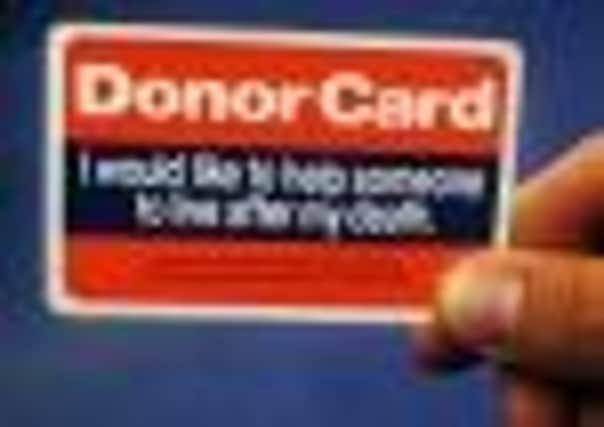Scots organ donations surge by 74% in five years


The Scottish Government said the number of donors in Scotland in 2012-13 was 94 – up from 54 in 2007-8 and equivalent to one life saved every four days.
The number of Scots dying while on the waiting list for an organ dropped from 55 to 34.
Advertisement
Hide AdAdvertisement
Hide AdThe statistics came as the chairwoman of the Organ Donation Taskforce (ODTF) said while good progress had been made across the UK, further action was needed to make organ donation an accepted part of society.
The 74.1 per cent increase in deceased donors in Scotland exceeds the UK-wide increase of 50 per cent, a target set by the ODTF in 2008. In the past 12 months, 285 Scots have received a life-saving transplant from a deceased donor compared with 211 in 2007-8, the figures showed.
The number of people on the NHS Organ Donor Register in Scotland also reached a record high of 2,147,995 at the start of this month, up from 1,479,103 in 2007-08. This means that 41.1 per cent of the population are now signed up, the highest in the UK.
Holyrood public health minister Michael Matheson said: “Organ donation can only occur as a result of tragic circumstances, but I also know that many donor families gain comfort from the fact that their loved one went on to save several lives.
“Reaching this increase is a landmark achievement. However, we must not forget the fact that around 600 Scots are still waiting for a transplant.”
In 2008, the ODTF set out a number of recommendations to boost donor numbers. Yesterday, its chairwoman, Elisabeth Buggins, said great progress had been made, but further action was needed to increase donations.
The ODTF recommendations include legislation to ensure the wishes of people who want to donate their organs are adhered to and not overturned by relatives. Ms Buggins said last year this happened with 125 potential donors across the UK.
She added: “Organ donation has yet to become a routine and accepted part of UK society and everyone has a role to play in making that a reality.”
Advertisement
Hide AdAdvertisement
Hide AdAs part of recommendations for further action, the ODTF suggested increasing public awareness, including making sure organ donation is a topic included in the school curriculum.
It also suggests encouraging debate on the issue by “posing potentially controversial proposals” in the media, such as the suggestion that people who have not signed the organ donor register should not be eligible to receive a transplant.
When the taskforce published its recommendations, there was disappointment among some that they had not supported the introduction of presumed consent for organ donation – meaning people would be considered to be potential donors unless they had specifically opted out.
Dr Sue Robertson, a member of the British Medical Association’s Scottish Council, said: “As long as there are patients waiting for transplants, the BMA believes that a soft opt-out system … would save more lives.”
Andrew Saunders, 36, from Edinburgh, yesterday spoke of the difference transplant surgery made to his life after he was diagnosed with advanced kidney disease a decade ago. He received his transplant in May 2010 and has since campaigned to raise awareness of organ donation.
He said: “I feel like my health has been going from strength to strength and I have been enjoying just spending time with my family and getting back to what I missed most when I was unwell.”